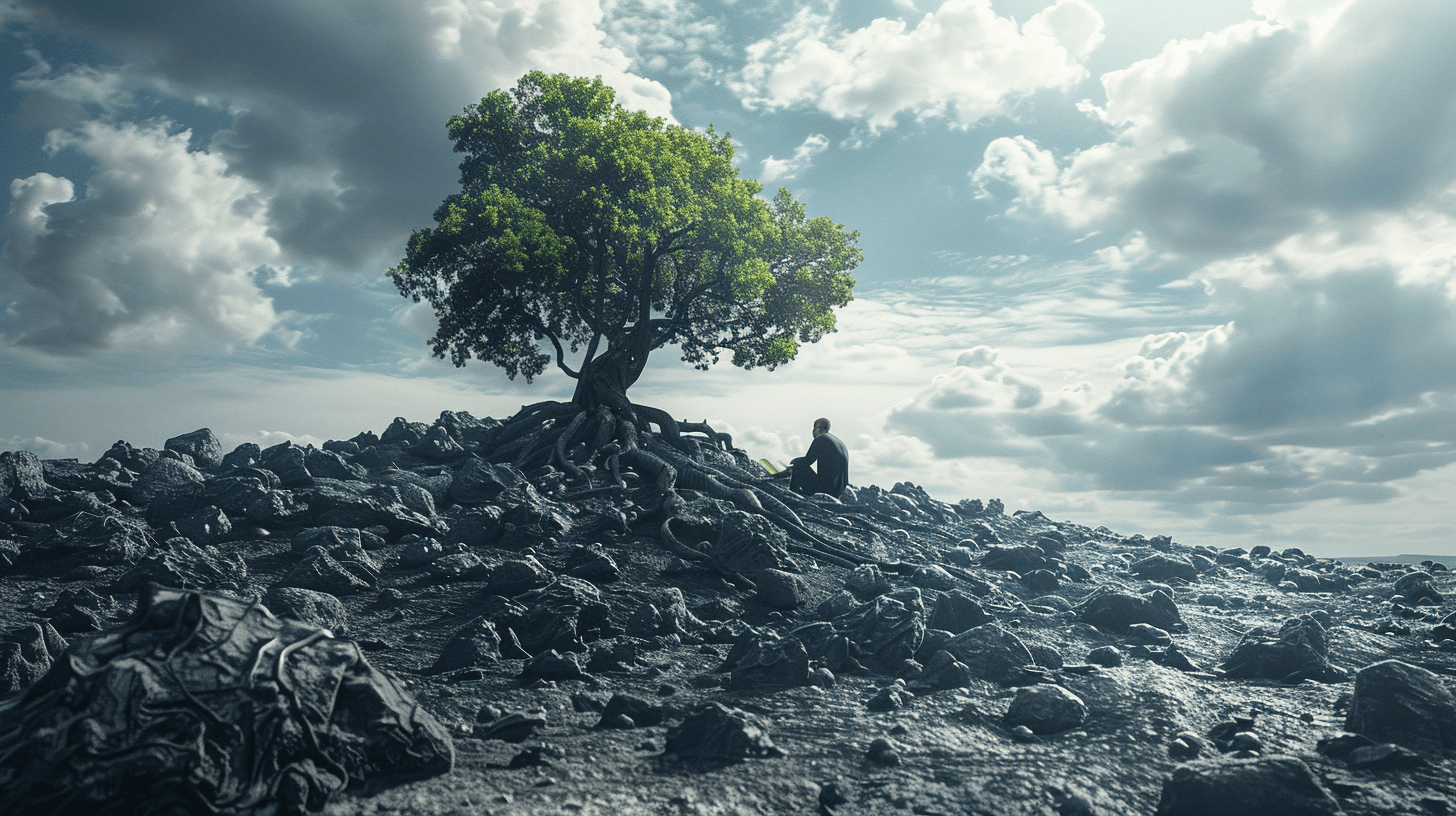Introduction: The Power of New Spiritual Ideas

In an age where information is more accessible than ever, the quest for spiritual growth remains one of the most profound journeys a person can undertake. Yet, despite the vast resources available, many seekers find themselves navigating the same well-trodden paths, encountering ideas that, while valuable, no longer challenge their perspectives or fuel their growth. The antidote to spiritual stagnation lies in exploring new spiritual ideas—concepts that push the boundaries of conventional thought and open new vistas of understanding.
Books, as repositories of human wisdom and experience, offer a unique portal into these unexplored territories. Unlike fleeting digital content, books provide depth, context, and a sustained engagement with complex ideas. They invite readers to not only absorb information but also to reflect, question, and integrate new insights into their lives.
This article is your guide to exploring new spiritual ideas through books. We will delve into the necessity of curiosity for spiritual growth, recommend books that introduce groundbreaking spiritual concepts, and offer practical strategies for integrating these new ideas into daily life. Our approach is grounded in first principles thinking—deconstructing conventional assumptions, analyzing the core elements of spiritual exploration, and reconstructing a path that leads to profound personal transformation.
Why Exploring New Spiritual Ideas is Essential for Growth

At the heart of any significant spiritual journey lies curiosity—a deep, insatiable desire to understand the mysteries of existence. Curiosity drives us to ask questions, seek answers, and explore ideas that challenge our current beliefs. It is the engine of spiritual evolution, propelling us beyond the comfortable confines of familiar doctrines and into the vast, uncharted territories of the unknown.
Curiosity is not just about acquiring new information; it is about the willingness to change. It involves the readiness to let go of outdated beliefs, the courage to embrace uncertainty, and the openness to integrate new perspectives. Without curiosity, spirituality can become stagnant, a set of fixed ideas rather than a dynamic process of growth and discovery.
Historically, spiritual pioneers—whether mystics, philosophers, or scientists—have been driven by curiosity. They dared to question the status quo, to explore ideas that others deemed heretical or irrelevant, and in doing so, they expanded the boundaries of human understanding. In the same vein, today’s spiritual seekers must cultivate a similar spirit of inquiry, embracing the unknown as a vital part of their spiritual journey.
Breaking Free from Spiritual Dogma
One of the most significant barriers to spiritual growth is dogma—rigid, unquestioned beliefs that resist change. While dogma can provide a sense of stability and certainty, it often comes at the cost of limiting spiritual exploration. Dogma demands conformity, discourages questioning, and stifles the creative impulse that is essential for true spiritual evolution.
Breaking free from dogma requires a deliberate effort to question long-held beliefs and to be open to new ideas. This does not mean abandoning all beliefs, but rather approaching them with a sense of fluidity and openness. It involves recognizing that spiritual truth is not a fixed entity but an evolving understanding that grows as we grow.
Books that introduce new spiritual ideas can be powerful tools in this process. They offer alternative perspectives, challenge conventional wisdom, and present new frameworks for understanding spiritual concepts. By engaging with these ideas, readers can break free from the constraints of dogma and embark on a more expansive, flexible, and ultimately fulfilling spiritual journey.
The Role of Books in Spiritual Exploration
Books have a unique role in spiritual exploration. Unlike other forms of media, which often prioritize speed and accessibility over depth, books provide a space for deep engagement with complex ideas. They allow readers to immerse themselves in new concepts, to reflect on their implications, and to integrate them into their understanding over time.
The act of reading itself is a contemplative practice. It requires focus, patience, and a willingness to engage with ideas that may be challenging or unfamiliar. This process of deep engagement is essential for exploring new spiritual ideas, as it allows readers to move beyond surface-level understanding and into the deeper, transformative insights that these ideas can offer.
Moreover, books connect us with the thoughts and experiences of others—whether they are contemporary authors, ancient sages, or spiritual leaders from different cultures and traditions. Through their words, we gain access to a vast repository of human wisdom, one that spans across time and space, offering insights that are as relevant today as they were centuries ago.
Top Books to Explore New Spiritual Ideas

“The Power of Now” by Eckhart Tolle
Summary: Eckhart Tolle’s “The Power of Now” is a seminal work that introduces readers to the concept of living fully in the present moment. Tolle argues that most of human suffering arises from our obsession with the past and the future—an obsession driven by the ego. By focusing on the present, we can transcend the ego and connect with a deeper sense of self.
Key Takeaways:
Presence as a Gateway to Spiritual Awakening: Tolle emphasizes that true spiritual awakening begins with the practice of presence—being fully aware of the here and now. This practice disrupts the ego’s hold on the mind and opens the door to a higher state of consciousness.
The Illusion of Time: Tolle challenges the conventional understanding of time, suggesting that past and future are constructs of the mind, and that only the present moment is real. This perspective invites readers to reframe their relationship with time and to live more fully in the present.
Ego and the False Self: The book explores the concept of the ego as a false self—a mental construct that creates a sense of separation and fear. Tolle provides practical guidance on how to recognize and transcend the ego, leading to greater peace and clarity.
Why It’s Essential: “The Power of Now” is a foundational text for anyone seeking to deepen their spiritual awareness. Its teachings are accessible yet profound, offering a clear pathway to spiritual awakening through the practice of presence. For those looking to explore new spiritual ideas, this book provides a powerful introduction to the transformative potential of mindfulness and living in the now.
“The Tao of Physics” by Fritjof Capra
Summary: Fritjof Capra’s “The Tao of Physics” is a groundbreaking work that explores the parallels between modern physics and Eastern mysticism. Capra argues that the discoveries of quantum physics, relativity, and particle physics resonate deeply with the spiritual insights of Taoism, Buddhism, and Hinduism.
Key Takeaways:
The Unity of Science and Spirituality: Capra challenges the conventional separation between science and spirituality, suggesting that both disciplines are paths to understanding the same underlying reality. He explores how the principles of modern physics mirror the insights of ancient spiritual traditions.
The Interconnectedness of All Things: Both quantum physics and Eastern mysticism emphasize the interconnectedness of all things. Capra explores how the concept of interdependence, central to both physics and mysticism, challenges the Western notion of separate, independent entities.
A Holistic Understanding of Reality: The book advocates for a holistic understanding of reality, one that integrates scientific knowledge with spiritual wisdom. This perspective encourages readers to move beyond reductionist thinking and to embrace a more interconnected, dynamic view of the universe.
Why It’s Essential: “The Tao of Physics” is essential reading for those interested in bridging the gap between scientific inquiry and spiritual exploration. Capra’s insights offer a holistic view of the universe, challenging readers to rethink the relationship between science and spirituality. This book is particularly valuable for those who are intellectually engaged and curious about the intersections between different fields of knowledge.
“Be Here Now” by Ram Dass
Summary: “Be Here Now” is a spiritual classic by Ram Dass, a former Harvard professor who became a spiritual seeker after his transformative experiences in India. The book is a blend of autobiography, spiritual teachings, and practical advice, all centered around the practice of being fully present in the moment.
Key Takeaways:
The Journey from Mind to Heart: Ram Dass’s journey from academic to spiritual seeker illustrates the shift from intellectual understanding to experiential wisdom. He emphasizes the importance of moving beyond the mind and into the heart—where true spiritual insight resides.
Presence and Mindfulness: The book’s central theme is the practice of presence—being fully aware and engaged in the present moment. Ram Dass offers practical advice on how to cultivate mindfulness in daily life, encouraging readers to live with greater authenticity and clarity.
The Integration of East and West: “Be Here Now” integrates Eastern spiritual teachings with Western psychology, offering a unique perspective on spiritual growth that resonates with a Western audience. This integration makes the book accessible to those who may be new to Eastern spirituality.
Why It’s Essential: “Be Here Now” is a vital resource for those looking to cultivate mindfulness and spiritual presence. Its teachings are simple yet profound, making it an ideal starting point for anyone seeking to explore new spiritual ideas. Ram Dass’s blend of personal experience and spiritual wisdom makes the book both relatable and inspiring, offering readers a roadmap to greater presence and peace.
“Man’s Search for Meaning” by Viktor Frankl
Summary: “Man’s Search for Meaning” is a powerful memoir by Viktor Frankl, a Holocaust survivor and psychiatrist, who developed a form of existential therapy known as logotherapy. The book explores Frankl’s experiences in Nazi concentration camps and his insights into finding meaning in life, even in the most horrific circumstances.
Key Takeaways:
The Search for Meaning: Frankl argues that the search for meaning is the primary drive in human life. He suggests that even in the face of suffering, individuals can find purpose and meaning, which gives them the strength to endure and overcome challenges.
Freedom and Responsibility: The book emphasizes the idea that while we cannot always control our circumstances, we can choose how we respond to them. This freedom to choose one’s attitude in any situation is a central tenet of Frankl’s philosophy.
Existential and Spiritual Growth: Frankl’s experiences and insights highlight the potential for existential and spiritual growth in the face of adversity. He encourages readers to find meaning in their lives, regardless of their external circumstances, and to live with purpose and intention.
Why It’s Essential: “Man’s Search for Meaning” is essential for those seeking spiritual meaning and resilience. Frankl’s insights into the human condition offer a profound perspective on the importance of purpose and meaning in life. For readers exploring new spiritual ideas, this book provides a powerful reminder of the potential for growth and transformation, even in the most challenging situations.
“The Four Agreements” by Don Miguel Ruiz
Summary: “The Four Agreements” by Don Miguel Ruiz is a spiritual guide based on ancient Toltec wisdom. The book presents four simple yet powerful agreements that individuals can make with themselves to achieve personal freedom and spiritual growth.
Key Takeaways:
Be Impeccable with Your Word: The first agreement emphasizes the power of language and the importance of speaking with integrity. Ruiz encourages readers to use their words to uplift and empower rather than harm or diminish.
Don’t Take Anything Personally: The second agreement teaches that the actions and opinions of others are reflections of their own reality, not of the individual. By not taking things personally, readers can free themselves from unnecessary suffering.
Don’t Make Assumptions: The third agreement advises against making assumptions, which can lead to misunderstandings and conflict. Ruiz encourages clear communication and seeking clarity in interactions with others.
Always Do Your Best: The fourth agreement emphasizes the importance of effort and intention. By always doing their best, readers can avoid self-judgment and regret, leading to a more fulfilling and peaceful life.
Why It’s Essential: “The Four Agreements” offers a practical framework for personal freedom and spiritual growth. Its teachings are straightforward and actionable, making it accessible to readers at any stage of their spiritual journey. For those exploring new spiritual ideas, this book provides a set of guiding principles that can be easily integrated into daily life, leading to greater clarity, peace, and empowerment.
How to Choose the Right Book for Your Spiritual Journey

Choosing the right spiritual book starts with an honest assessment of where you are on your spiritual journey. Are you seeking healing, enlightenment, understanding, or something else entirely? Understanding your current needs will help you identify which book will resonate most deeply with you.
Healing: If you’re seeking healing—whether emotional, psychological, or spiritual—consider books that offer practical tools for self-care, forgiveness, and inner peace. “The Four Agreements” is a great choice for those looking to release limiting beliefs and cultivate self-compassion.
Enlightenment: If your goal is enlightenment or a deeper understanding of the nature of reality, you might be drawn to books that explore complex spiritual concepts and challenge conventional thinking, such as “The Tao of Physics” or “A New Earth.”
Understanding: If you’re seeking a deeper understanding of specific spiritual traditions or practices, consider books that provide in-depth insights into those areas, such as “Autobiography of a Yogi” for Eastern spirituality or “Be Here Now” for mindfulness and presence.
Balancing Familiarity with Exploration
As you explore new spiritual ideas, it’s important to balance the exploration of unfamiliar concepts with maintaining a connection to familiar practices. This balance helps you stay grounded while allowing for growth and transformation.
Start with Familiar Themes: If you’re new to exploring spiritual ideas, start with books that touch on themes you’re already familiar with. This will provide a sense of continuity as you venture into new territory.
Gradually Introduce New Concepts: As you become more comfortable, gradually introduce books that challenge your current beliefs or present entirely new ideas. This approach allows for a more gentle and sustainable exploration of new spiritual concepts.
Considering Different Spiritual Traditions
Exploring new spiritual ideas often involves engaging with different spiritual traditions. Whether you’re drawn to Eastern philosophies, Western mysticism, or indigenous spiritual practices, it’s important to approach each tradition with respect and openness.
Eastern Spirituality: Books like “Autobiography of a Yogi” and “The Tao of Physics” offer insights into Eastern spiritual traditions, emphasizing concepts like interconnectedness, meditation, and self-realization.
Western Mysticism: For those interested in Western spiritual traditions, consider exploring books that delve into mysticism, such as “A New Earth” or “Be Here Now,” which integrate Western thought with spiritual practice.
Indigenous Spirituality: Indigenous spiritual traditions offer a deep connection to nature and the cycles of life. While not covered in the top five books above, consider expanding your exploration to include works that focus on indigenous wisdom and practices.
Practical Criteria for Selection
When choosing a book, consider practical criteria such as the author’s background, the book’s relevance to your current spiritual questions, and the clarity and accessibility of the writing.
Author’s Background: Research the author’s background and expertise to ensure that their insights are credible and resonate with your values. For example, Eckhart Tolle’s background in spiritual teaching lends credibility to his exploration of ego and consciousness in “A New Earth.”
Relevance to Your Journey: Choose books that address your current spiritual questions or challenges. If you’re struggling with the concept of ego, “A New Earth” may be particularly relevant. If you’re interested in the intersection of science and spirituality, “The Tao of Physics” would be a fitting choice.
Clarity and Accessibility: Consider the writing style and accessibility of the book. Some spiritual books are deeply philosophical and require careful study, while others offer more straightforward, practical advice. Choose a book that matches your preferred reading style and level of engagement.
Integrating New Spiritual Ideas into Daily Life

Start with Mindful Reflection
Mindful reflection is a powerful tool for integrating new spiritual ideas into your daily life. It involves setting aside time to reflect on what you’ve read and how it resonates with your beliefs and experiences.
Daily Journaling: Consider keeping a spiritual journal where you record your thoughts, insights, and questions as you explore new spiritual ideas. This practice helps solidify your understanding and provides a space for personal reflection.
Meditation: Use meditation as a way to internalize new spiritual concepts. For example, after reading about the interconnectedness of all things in “The Tao of Physics,” you might meditate on the ways in which this idea manifests in your own life.
Experiment with New Practices
Books that introduce new spiritual ideas often come with practices or exercises that can be integrated into daily life. Experimenting with these practices allows you to embody the ideas and see how they work in practice.
Meditation Techniques: If you’re reading “Autobiography of a Yogi,” try incorporating some of Yogananda’s meditation techniques into your daily routine. Observe how these practices affect your mental and spiritual well-being.
Mindfulness Exercises: After reading “Be Here Now,” experiment with mindfulness exercises that help you stay present throughout the day. These exercises can be as simple as focusing on your breath or paying full attention to a routine task.
Share and Discuss with Others
Discussing new spiritual ideas with others is a valuable way to deepen your understanding and gain different perspectives. Whether through study groups, online communities, or informal conversations, sharing your journey with others can be both enlightening and supportive.
Book Clubs: Consider joining or starting a book club focused on spiritual topics. This provides a structured environment for discussing new ideas and learning from others’ experiences.
Online Forums: Engage in online forums or social media groups where you can connect with like-minded individuals who are also exploring new spiritual ideas. These platforms offer a space for sharing insights, asking questions, and receiving feedback.
Reflect and Reevaluate
Spiritual exploration is an ongoing process that requires regular reflection and reevaluation. As you integrate new ideas into your life, take time to assess their impact and adjust your practices as needed.
Periodic Reevaluation: Set aside time every few months to reflect on how new spiritual ideas are influencing your life. Are they leading to positive changes? Do they resonate with your core values? Use these reflections to determine whether to continue exploring these ideas or to shift your focus.
Letting Go of Ideas: It’s important to recognize that not every idea will resonate with you or serve your spiritual growth. Be willing to let go of concepts that no longer align with your beliefs or contribute to your well-being.
Resources for Further Spiritual Exploration

Additional Book Recommendations
For those eager to continue exploring new spiritual ideas, here are additional books that delve into various spiritual traditions, modern spiritual movements, and alternative practices:
“The Untethered Soul” by Michael A. Singer: This book explores the nature of consciousness and the self, offering insights into how to achieve inner peace and spiritual freedom.
“Man’s Search for Meaning” by Viktor E. Frankl: A powerful exploration of finding meaning in life, particularly in the face of suffering. It offers a unique perspective on spirituality and personal growth.
“Conversations with God” by Neale Donald Walsch: A provocative dialogue that challenges conventional religious beliefs and introduces new spiritual concepts.
Online Courses and Workshops
Spiritual Exploration Courses: Websites like Coursera and Udemy offer courses on a wide range of spiritual topics, from mindfulness and meditation to exploring different religious traditions.
Workshops and Retreats: Consider attending workshops or retreats focused on spiritual growth. These events provide immersive experiences where you can engage deeply with new ideas and practices.
Spiritual Communities and Forums
Online Communities: Platforms like Reddit, Facebook groups, and dedicated spiritual forums provide spaces to connect with others who are exploring similar spiritual ideas.
Local Meetups: Use platforms like Meetup.com to find local groups focused on spiritual discussion and practice. Engaging with a community in person can provide additional support and inspiration.
Podcasts and Documentaries
Podcasts: Listen to podcasts like “On Being” or “The Tim Ferriss Show,” which often feature discussions on spiritual topics with a wide range of guests.
Documentaries: Watch documentaries that explore spiritual themes, such as “The Secret” or “What the Bleep Do We Know?” These films offer visual and narrative explorations of spiritual ideas, providing both educational content and inspiration.
Conclusion: Embracing the Journey of Spiritual Discovery

The exploration of new spiritual ideas is not just a journey of the mind; it is a transformative process that can profoundly impact every aspect of your life. By engaging with new concepts, experimenting with practices, and reflecting on their implications, you open yourself up to new possibilities for growth and understanding.
Remember, the journey of spiritual exploration is deeply personal and ever-evolving. There is no final destination—only continuous learning, growth, and expansion of consciousness. As you delve into new spiritual ideas, approach each book, each practice, and each insight with curiosity, openness, and a willingness to transform.
Take the first step today by choosing a book that resonates with you, begin your exploration, and integrate the new ideas into your life. Share your journey with others, reflect regularly on your progress, and remain open to the endless possibilities that spiritual exploration can offer.
By embracing this journey with an open heart and a curious mind, you will not only expand your understanding of the spiritual world but also enrich your life with deeper meaning, purpose, and connection.







